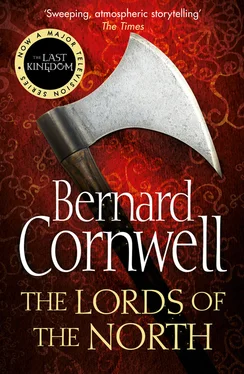I understood all that, but what did not make sense was why seven Saxon churchmen had come from Cair Ligualid to pay a fortune for Guthred who was both a Dane and a pagan. ‘Because I’m their king, of course,’ Guthred said, as though the answer were obvious, ‘though I never thought I’d become king. Not after Eochaid took me captive, but that’s what the Christian god wants, so who am I to argue?’
‘Their god wants you?’ I asked, looking at the seven churchmen who had travelled so far to free him.
‘Their god wants me,’ Guthred said seriously, ‘because I’m the chosen one. Do you think I should become a Christian?’
‘No,’ I said.
‘I think I should,’ he said, ignoring my answer, ‘just to show gratitude. The gods don’t like ingratitude, do they?’
‘What the gods like,’ I said, ‘is chaos.’
The gods were happy.
Cair Ligualid was a sorry place. Norsemen had pillaged and burned it two years before, just after Guthred’s father had been killed by the Scots, and the town had not even been half rebuilt. What was left of it stood on the south bank of the River Hedene, and that was why the settlement existed, for it was built at the first crossing place of the river, a river which offered some protection against marauding Scots. It had offered no protection against the fleet of Vikings who had sailed up the Hedene, stolen whatever they could, raped what they wanted, killed what they did not want, and taken away the survivors as slaves. Those Vikings had come from their settlements in Ireland and they were the enemies of the Saxons, the Irish, the Scots and even, at times, of their cousins, the Danes, and they had not spared the Danes living in Cair Ligualid. So we rode through a broken gate in a broken wall into a broken town, and it was dusk, and the day’s rain had finally lifted and a shaft of red sunlight came from beneath the western clouds as we entered the ruined town. We rode straight into the light of that swollen sun which reflected from my helm that had the silver wolf on its crest and it shone from my mail coat and from my arm rings and from the hilts of my two swords, and someone shouted that I was the king. I looked like a king. I rode Witnere who tossed his great head and pawed at the ground and I was dressed in my shining war-glory.
Cair Ligualid was crowded. Here and there a house had been rebuilt, but most of the folk were camping in the scorched ruins, along with their livestock, and there were far too many of them to be the survivors of the old Norse raids. They were, instead, the people of Cumbraland who had been brought to Cair Ligualid by their priests or lords because they had been promised that their new king would come. And now, from the east, his mail reflecting the brilliance of the sinking sun, came a gleaming warrior on a great black horse.
‘The king!’ another voice shouted, and more voices took up the cry, and from the wrecked homes and the makeshift shelters folk scrambled to stare at me. Willibald was trying to hush them, but his West Saxon words were lost in the din. I thought Guthred would also protest, but instead he pulled his cloak’s hood over his head so that he looked like one of the churchmen who struggled to keep up as the crowd pressed in on us. Folk knelt as we passed, then scrambled to their feet to follow us. Hild was laughing, and I took her hand so she rode beside me like a queen, and the growing crowd accompanied us up a long, low hill towards a new hall built on the summit. As we grew closer I saw it was not a hall, but a church, and that priests and monks were coming from its door to greet us.
There was a madness in Cair Ligualid. A different madness from that which had shed blood in Eoferwic, but madness just the same. Women were crying, men shouting and children staring. Mothers held babies towards me as if my touch could heal them. ‘You must stop them!’ Willibald had managed to reach my side and was clinging onto my right stirrup.
‘Why?’
‘Because they’re mistaken, of course! Guthred is king!’
I smiled at him. ‘Maybe,’ I said slowly, as though the idea were just coming to me, ‘maybe I should be king instead?’
‘Uhtred!’ Willibald said, shocked.
‘Why not?’ I asked. ‘My ancestors were kings.’
‘Guthred is king!’ Willibald protested. ‘The abbot named him!’
That was how Cair Ligualid’s madness began. The town had been a haunt of foxes and birds when Abbot Eadred of Lindisfarena came across the hills. Lindisfarena, of course, is the monastery hard by Bebbanburg. It lies on Northumbria’s eastern coast, while Cair Ligualid is on the western edge, but the abbot, driven from Lindisfarena by Danish raids, had come to Cair Ligualid and there built the new church to which we climbed. The abbot had also seen Guthred in his dreams. Nowadays, of course, every Northumbrian knows the story of how Saint Cuthbert revealed Guthred to Abbot Eadred, but back then, on the day of Guthred’s arrival in Cair Ligualid, the tale seemed like just another insanity on top of the world’s weltering madness. Folk were shouting at me, calling me king and Willibald turned and bellowed to Guthred. ‘Tell them to stop!’
‘The people want a king,’ Guthred said, ‘and Uhtred looks like one. Let them have him for the moment.’
A number of younger monks, armed with staves, kept the excited people away from the church doors. The crowd had been promised a miracle by Eadred and they had been waiting for days, expecting their king to come, and then I had ridden from the east in the glory of a warrior, which is what I am and always have been. All my life I have followed the path of the sword. Given a choice, and I have been given many choices, I would rather draw a blade than settle an argument with words, for that is what a warrior does, but most men and women are not fighters. They crave peace. They want nothing more than to watch their children grow, to plant their seeds and live to see the harvest, to worship their god, to love their family and to be left in peace. Yet it has been our fate to be born in a time when violence ruled us. The Danes appeared and our land was shattered, and all around our coasts the long ships with their beaked prows came to raid and enslave and steal and kill. In Cumbraland, which is the wildest part of all the Saxon lands, the Danes came and the Norsemen came and the Scots came, and no one could live in peace, and I think that when you break men’s dreams, when you destroy their homes and ruin their harvests and rape their daughters and enslave their sons, you engender a madness. At the world’s ending, when the gods will fight each other, all mankind will be stricken with a great frenzy and the rivers will flow with blood and the sky shall be filled with screaming and the great tree of life will fall with a crash that will be heard beyond the farthest star, but all that is yet to come. Back then, in 878 when I was young, there was just a smaller madness at Cair Ligualid. It was the madness of hope, the belief that a king, born in a churchman’s dream, would end a people’s suffering.
Abbot Eadred was waiting inside the cordon of monks and, as my horse came close, he raised his hands towards the sky. He was a tall man, old and white-haired, gaunt and fierce, with eyes like a falcon and, surprising in a priest, he had a sword strapped to his waist. He could not see my face at first because my cheek-pieces hid it, but even when I took off my helmet he still thought I was the king. He stared up at me, raised thin hands to heaven as if giving thanks for my arrival, then gave me a low bow. ‘Lord King,’ he said in a booming voice. The monks dropped to their knees and stared up at me. ‘Lord King,’ Abbot Eadred boomed again, ‘welcome!’
‘Lord King,’ the monks echoed, ‘welcome.’
Читать дальше












